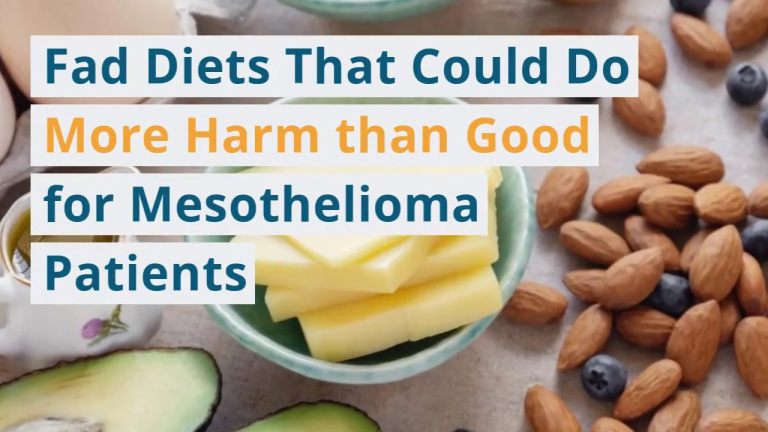20 Foods to Promote Lung Health and 5 to Avoid
Written by Karen Selby, RN
Lung-Healthy Food Types
While exposure to asbestos or hereditary asthma might not be avoidable, you have the power over what foods you eat. Shying away from unhealthy and fried foods can help you maintain your overall health while easing symptoms of lung disease.
While high-calorie foods might not be recommended for most people, those with cancer should try to maintain their weight. Focus on getting plenty of protein along with healthy fats and carbs.
Healthy Fats
Monounsaturated and polyunsaturated fats don’t contain cholesterol and usually come from plant sources. These healthy fats can help manage blood pressure, reduce inflammation and improve your overall health, which can help you breathe easier.
Recommended- Nuts
- Eggs
- Olive oil
- Avocado
Proteins
Proteins help keep your body strong and can help your body produce immune system cells. You’ll want to eat a good source of protein at least twice per day to help strengthen your respiratory cells and make you stronger.
Recommended- Lean meats
- Eggs
- Beans
Complex Carbs
Complex carbohydrates are high in fiber, which can help regulate the digestive system and blood sugar levels. You’ll want to limit simple carbohydrates such as table sugar and candy, which can cause obesity and hypertension. Instead, opt for complex carbs such as those found in some produce and whole-grain bread and pasta, which can help provide fiber and energy.
Recommended- Whole-grain bread
- Pasta
- Fresh produce
Fresh Produce
Fresh fruits and vegetables include minerals, vitamins and fiber that help keep your body healthy and in shape. However, some produce is better for your lung health than others. Opt for berries, pineapples and grapes over apples, apricots and peaches, which can cause bloating.
RecommendedLow-FODMAP fruits, including:
- Berries
- Pineapples
- Grapes
- Non-starchy vegetables, including:
- Broccoli
- Peas
- Tomatoes
Potassium
Potassium can help reduce water retention, regulate blood pressure and improve digestion, so it’s important to have a healthy level of it to maintain good lung function. The most common source of potassium is bananas, but it’s also found in other produce items.
Recommended- Bananas
- Leafy greens
- Tomatoes
- Beets

Receive a free guide with the latest information on emerging treatments and clinical trials.
Get Yours NowFoods to Promote Lung Health
Foods that promote lung health are rich in antioxidants, vitamins and omega-3 fatty acids. These foods help reduce inflammation, protect lung tissue, and improve respiratory function.
If you have mesothelioma, I recommend increasing your intake of produce because it’s vital to building a healthy body. Research indicates that plant-based foods loaded with antioxidants and phytochemicals, such as fruits and vegetables, can help fight cancer.
Consuming berries, nuts, fatty fish, garlic and turmeric can also support lung health because of their anti-inflammatory and antioxidant properties. The following foods have also been shown to have a positive impact on lung health.
Apples
Due to the presence of the antioxidant quercetin, apples have been proven to reduce lung decline and even reduce lung damage caused by smoking. Those who eat five or more apples per week were also at a reduced risk of developing COPD.
Beets
Beetroot and beet greens have been shown to benefit lung function, relax blood pressure and optimize oxygen intake, all of which can help someone struggling to breathe. Beets are also packed with vitamins and nutrients that promote lung health, like magnesium and potassium.
Pumpkin
Pumpkins are rich in carotenoids, which are associated with higher lung function. Carotenoids also contain antioxidant and anti-inflammatory properties, which promote overall health and comfort.
Tomatoes
Tomatoes are one of the richest vegetable sources of lycopene, a carotenoid that has been associated with improved lung function. Consuming tomatoes and tomato products has also been linked to reduced lung decline and airway inflammation.
Leafy Greens
Leafy greens such as bok choy, spinach and kale are a rich source of carotenoids, iron, potassium, calcium and vitamins. These nutrients have anti-inflammatory and antioxidant effects, which can help reduce lung inflammation and promote overall health.
Food Types to Avoid if You Have Lung Disease
Certain foods and diets don’t help people with lung conditions like mesothelioma. Certain foods don’t provide enough nutrients or calories, or they promote unwanted side effects.
For example, some foods promote fluid retention, stomach issues or conflict with certain medications. Avoiding these foods can help keep lung disease symptoms at bay.
Salty Foods
Sodium causes fluid retention, which can lead to shortness of breath in patients who have lung disease. And while the salt shaker is the most obvious source of sodium, the bulk of sodium intake is actually already in the food. To reduce sodium intake, cut back on salty seasonings and check the labels on the foods you buy to confirm they don’t contain more than 300 milligrams of salt per serving.
To reduce salt intake: Opt for herbs and spices to season food and check food labels before purchasing.
Dairy Products
As the body digests dairy products, a breakdown of milk digestion called casomorphin increases the amount of phlegm and mucus produced by the body. This can increase coughing, which can cause wheezing and pain in COPD patients.
To reduce dairy intake: Trade lactose for milk alternatives such as almond, oat or soy milk.
Processed Meats
Cured meats and cold cuts contain nitrates, which companies often add to these products for color and to help extend shelf life. These nitrates, however, have been found to lead to an increase in COPD-related hospital readmissions.
To reduce processed meat intake: Avoid deli meat or look for a “no nitrates added” label on the product.
Soda
Drinking soda can be harmful to those with lung disease in several ways. First, soda contains carbon dioxide to make it carbonated, which can cause gas and bloating that makes it harder to breathe. In addition, the high sugar content can increase inflammation and lead to weight gain, both of which can exacerbate COPD symptoms.
To reduce soda intake: Try switching soda out with other noncarbonated, flavored beverages like tea, flavored water or natural juice.
Fried Foods
Fried foods such as french fries and onion rings contain unhealthy fats that can cause bloating and discomfort by pushing on the diaphragm. In addition to lung discomfort caused by bloating, fried foods over time can lead to higher cholesterol and weight gain. For people living with lung disease, these things can worsen symptoms.
To reduce fried food intake: Avoid fast-food chains and drive-thru meals.

Learn expert insights from two top mesothelioma specialists and a 9-year pleural survivor who beat the odds.
Get a RecordingLung-Damaging Foods to Avoid
Lung-damaging foods can include processed meats, sugary drinks and trans fats. These can increase inflammation and oxidative stress, which harms lung function. Excessive salt and fried foods may worsen respiratory conditions by promoting fluid retention and inflammation.
Specific foods to eat or avoid will really depend on your individual side effects. For example, if you are experiencing a sore throat, I recommend avoiding spicy and acidic foods such as orange juice or hot sauces as these can further irritate your throat.
The following foods have been proven to negatively impact lung function. Limiting alcohol is also advised because it can impair immune responses and lung health.
White Bread
Simple carbohydrates such as white bread should be avoided, as it takes more work for the lungs to metabolize them. Switching out these simple carbs for whole-grain, complex carbohydrates can improve lung health.
Potato Chips
Potato chips are filled with salt and saturated fat, two things that are detrimental to lung health. Trans and saturated fats harm your cardiovascular health and can raise blood pressure. The salt in chips can also increase water retention, making it harder to breathe.
Chocolate
First and foremost, chocolate contains caffeine, which can interfere with medication or increase heart rate. Chocolate is also high in sugar and low in nutrients, making it a generally bad choice for someone with lung disease.
Beer
In general, alcohol can increase inflammation in the lungs. For those with poor lung health, beer is a bad choice specifically because it’s also carbonated and can cause bloating, which puts extra pressure on the lungs and can make it harder to breathe.
Cold Cuts
The nitrates in processed cold cuts have been linked to lung decline and worsening COPD symptoms. Lean meats like salmon and chicken are a better choice for those who want to eat meat.

Lung disease and discomfort are hard to live with. Keeping your body healthy through diet and nutrition is another way you can improve your overall health and make cancer treatment easier. To talk about a diet plan while navigating treatment, find a doctor who is right for you.










